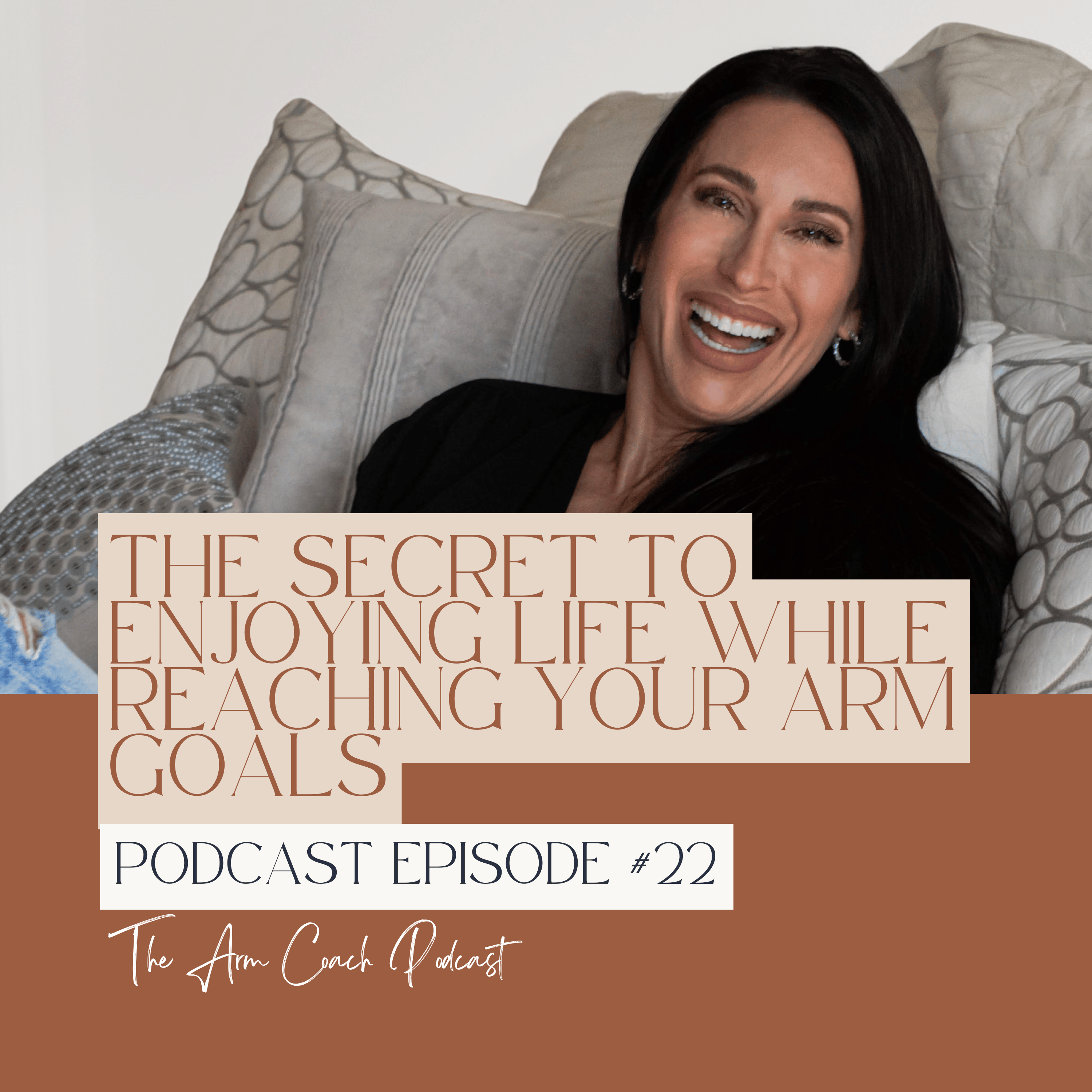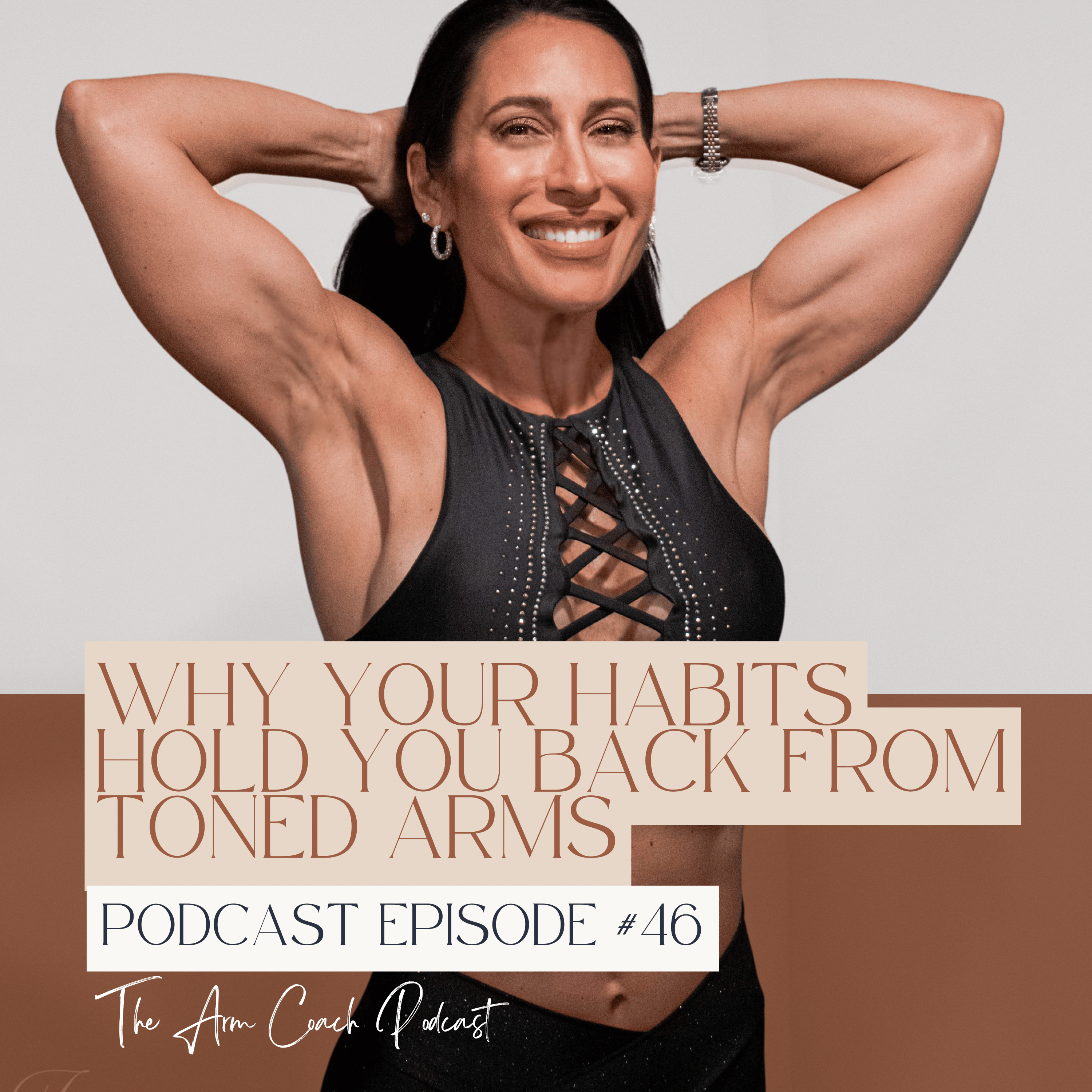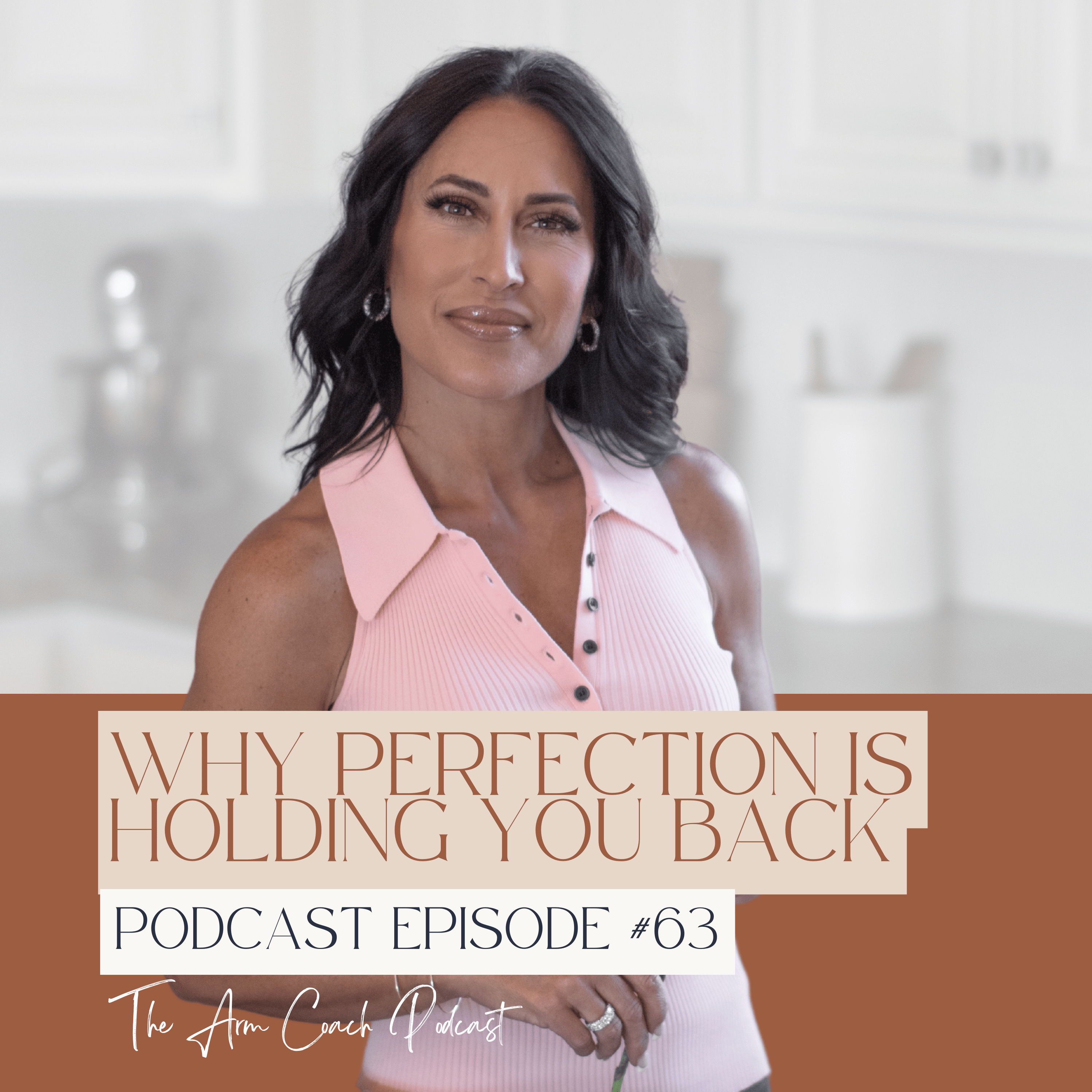Episode Transcript
What do you think of when I say the word accountability?
Do you think of your old strict 5th grade teacher, asking you for
your book report? I thought so.
And what do you think about when I talk about structure?
Do you think of a rigid schedule that has no flexibility and feels a
little like prison? Yup. I thought that you might think that.
So, here’s the reality. When you want to achieve sculpted
arms, or anything, you need to have a path. Some guidelines.
Some things in place that help you know where you are going,
how to get there, and signs that you’ve arrived.
That’s exactly what accountability and structure give you.
They give you a framework for doing what you most want to
do. These are things you can create for yourself, by you, for
you. So, there is nothing to rebel against.
Let’s take a look at how accountability and structure can very
positively affect how you exercise and how you deal with
food, so that you can get what you want: toned, sculpted
arms, losing that extra weight, and living your best life.
Hi everybody and welcome to The Arm Coach Podcast episode
#27.
Today, we're going to work on understanding and thinking
through how accountability and structure help you sculpt your
arms. I was thinking about Arms By Kristine because we're
working on it right now.”
“And I was thinking about what makes it work. You know, you
have my program, which we put our clients through, but there are
other parts of Arms By Kristine that make it work because
otherwise, everyone could just read a book and follow someone
and get a plan, something written out, and do it on their own. But
I want you to think about what helps you reach a goal.”
“What helps you reach a goal is, yes, getting information, but it
also is structure and accountability and camaraderie and
guidance and getting feedback. These things, structure and
accountability, make your life easier. They give you more time,
they give you a better chance of reaching your goals.”
“I want to tell you a little bit about what they are and why and
how they work and help you make a plan to incorporate both of
these concepts, structure and accountability into your life, into
whatever you're working on. Now, I know when you hear those
words that you might have some negative connotations for both
of them. I'm going to address that with you, so stick with me here
because I'm going to give you some valuable info.
Now, what is accountability? Why does it work? How do we use
it?”
“Here's the thing. Accountability means that you're allowing
yourself to be held responsible for doing something, something
that you hopefully want to be doing. And in the case of working
on sculpting your arms, working on your eating issues, you're
working towards your goal.
It would be someone or something helping you be responsible to
yourself to take the steps you need to take to reach that goal.
You might think of it negatively when you hear the word because
possibly you're thinking, oh, somebody's going to hold me
accountable. That means somebody's going to really push me or
somebody's going to be really hard on me.”
“But that's not really what it is. It's for you. It's definitely for your
benefit.
And it's something that you put in place for yourself. Nobody can
make you accountable. Yes, if you have a job, your boss might
say, you need to be here from nine to five, and that might hold
you accountable to your company, to your boss.
But we're talking about your personal life, something that you
want to achieve, some progress that you want to make, some
goal you want to reach. So being held responsible to do those
steps towards that goal is a good thing. It's what you want.”
“One of the things that helps you be accountable to yourself is to
really get clear on what your goal is and to say it out loud,
because that puts it out there in the world, and that helps you
own it, take responsibility for it, be in charge of what you're
doing. It helps you make a priority. You know, there are different
ways to look at things that we've talked about before.
We could just think it, but then we could take it to another level
and say it out loud and let the people in our world know what
we're working on. You could tell a person, you know, somebody
that's in your life, what you're planning to do, and then they
know, and even if they're not coming to you every day saying,
hey, did you do that today? Did you do that thing that you're
trying to do?”
“Even if they don't do that, you know that somebody's kind of
looking around, seeing if you're actually living up to what you
said. Now, when it comes to your arms and your nutrition, when
you have accountability, you're pretty much establishing
guidelines for yourself. And one of the ways that you could do
this is to think, how do I want to create a format, a framework,
guideline, where I know ahead of time what I'm going to do.
Not every single moment, but generally a framework. So you
might think to yourself, okay, I am going to always do blank, and I
am going to never do blank. I will mostly do blank, or I will rarely
do that”
“So you could see how there's some flexibility in there. Nobody's
making you do anything, but when you have these rules or
guidelines in your mind, it's something that will help you make
decisions. When you do those things over and over again, that's
when they become habits.
And you know from listening to me that habits make your life
easier. So that's what accountability is, where you say what
you're going to do, and you or somebody else, or something
else, and I'll tell you how to do that a little later on, but something
or someone is helping you do what you say you're going to do. It
doesn't have to only be you, but it can be only you.
The second thing we were going to talk about adding into your
life is structure. Structure is very connected to discipline. It's
when you have a way of doing something that you can repeat
over and over again like a routine or a ritual.
“And it's something that keeps you very grounded because even
though you're making this up and you're deciding what your
structure should be, it's something that lets you follow a plan. It
makes your life easier just like accountability can. For this
concept, you also might have a negative view of it.
You might think to yourself, structure is boring. You know, why
would I want to do the same thing all the time? Or why would I
want to know what I'm going to do ahead of time?
I'm a free spirit. I like to just go with the flow. But the reality is
that when you're trying to do something new, or you're trying to
change something, that going with the flow most of the time
does not work.”
“You want to get somewhere, therefore you've got to know the
path that you're on. What is the path? Well, the path is your
structure, and it makes your life easier because it lets you really
make sure that you're doing the things that matter.
Now, when you think about structure with your arms workouts or
nutrition, just like we talked about how accountability can relate
to that, I want you to think about what your routines are. Do you
have a routine for where you lift weights, a routine for food, for
planning, for prepping, for taking care of yourself? What is your
plan?”
“Do you know what you're going to eat day by day? Do you have
a general plan that has some flexibility? I like to call that, and you
may have heard me mention this, soft structure.
It's structure, it's a guideline, but it has flexibility. And remember,
you're the one that's creating it. When you are the creator of your
structure, of your routine, there's nothing to rebel against.
The more routines you have in your life, allowing for free time and
allowing for flexibility and allowing time to be spontaneous, but
the more routines you have, it really eliminates having to make a
lot of different decisions and planning moment by moment,
because the routines are already in place. It also, just like
accountability, helps you build habits by being repetitive. This
does not mean that your life's going to be boring and you're
going to do the same thing day after day after day.”
“But it means that you're following your own guidelines. I hope
that you can begin to imagine what I'm talking about put into
your life so that you're not just floating around, not getting where
you want to go. Remember, the whole goal of this is that this is
for you to help you do whatever it is that you most want to do.
So how could you use these two concepts in your life, and
especially around the arm issues that we talk about here? Well,
yes, of course, you know that I'm going to say you could join a
group, and that's Arms By Kristine. And I hope that you do join
me.”
“You also could partner with a friend and make sure that you and
the friend have a talk about how you want her to hold you
accountable. What will feel good to you? And what will feel
intrusive?
You know how it is when you tell people that you're wanting to
lose weight, you're wanting to eat a certain way, and you'll start
eating in front of them, and that person trying to be helpful will
say, are you sure you want to eat that? And you'll go ballistic
because that's not the way that you want to hear it. But you have
to tell them how you want to hear it.
You could have a coach who's going to help you set up a plan.
You could write down your own plan, but I want you to make sure
that you put it in your calendar so it actually happens, it actually
gets done. You could use an app on your phone or your
computer, something that's going to remind you, and something
that will help you track what you're doing.”
“You could plan on Sundays. These are some different ways that
you could build that accountability factor into your life, into your
week, into your day. So how could you build structure into your
life and your day?
Well, one of the ways that you can, and this is one of the things
that I do, is sometime in the daytime or in the early evening, on a
Sunday, I will look at my week. I will look at what's going on. I will
look at when I will lift weights, go grocery shopping, when I will
prep some food.
I'll look at what my menu is for the week, just approximately. I'll
look at when my additional workouts and waking will be. Once
you plan your food, then I want you to look at your self-care.
And I want you to look at your fun and block that in there. You're
planning ahead to give yourself some structure. It really would be
good if you also decide, what's your morning routine?”
“What's your evening routine? What would feel good for you to
do, to look at, to read, to get inspired, to get motivated, to
remind you of your commitment when you wake up in the
morning? What would start your day off right?
And what would end your day on a good note? What would
make you feel good when you get into bed? And it might be
reviewing your day, thinking about what went well, because, you
know, you always have to look for that.
Your mind's going to go to what didn't go well naturally. What are
you grateful for? When you're putting structure into your life and
your week, I also want to remind you that you need to make
some time to think, not just to plan, but I want you to build into
that calendar, into this structure, time to just be.”
“Time to not be running around and trying to cross things off your
list. Time to be and think about where you are, who you are, what
you're doing, and that will help you stay focused on reaching that
goal. So if your goal is to sculpt your arms, change the way you
eat, get rid of the extra weight that you might be carrying, then I
want you to set yourself up for success.
And the way to do that is to create some accountability for
yourself and to create some structure. But remember, the
structure created by you needs to feel good. And so does the
accountability.
Now, you know that every time we have a session, or most every
time, I'm going to give you an action step, because listening is
good, but taking action on it is what will create real change. So
here's your step for this coming week. Here's what I want you to
focus on and do.”
“I want you to look at your life right now. Is there anything in your
life that helps you be accountable to you? Is there a person that
you talk things over with?
Is there a group that you're in? Do you write things down? Do
you make a plan and see if you can stick to it?
Is there structure in your life? Do you have some guidelines for
the way that you're operating in the world? Do you have any
routines?
Most importantly, do you have any routines that feel good? Or
does everything that you're doing take a lot of willpower and feel
kind of forced? If you force yourself, you're probably looking at it
as very black and white, but you're not giving yourself the
structure, the guidance that you need to get things done.”
“And I don't just mean the to-do list, I mean for you. So that's
what I want you to think about, to do a little reflection on where
you are right now with accountability and structure. All right,
that's it for this subject and our coaching session today.”


